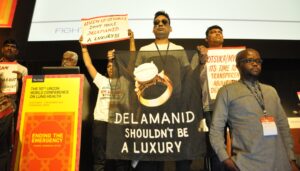1/4/6×24 Campaign Concerned Prices Hinder Uptake of Important Updated World Health Organization Drug-Resistant TB Treatment Recommendations
25 November 2024
Contact: Natalie Shure, natalie.shure@treatmentactiongroup.org
November 25, 2024 – The 1/4/6×24 Campaign warns that regimens to treat drug-resistant TB recently recommended by World Health Organization (WHO) and important diagnostic tools will remain out of reach due to high prices.
A Rapid Communication released by the World Health Organization (WHO) in August finally enables children, younger adolescents, pregnant women and persons, and other populations to benefit from newer, shorter treatment regimens for drug-resistant tuberculosis (DR-TB). This guideline update adds six- and nine-month regimens proven to be efficacious and safe in the BEAT-Tuberculosis and endTB trials to the global tool box for treating drug-resistant TB. The 1/4/6×24 Campaign welcomed the recommendation of these regimens as a life-line for populations that are otherwise excluded from access to the six-month BPaL/M regimen recommended by the WHO since 2022.
The inclusion of delamanid in these newly WHO-recommended regimens makes affordability an urgent issue. The Campaign welcomed the recent 29% reduction in the price of delamanid from US$1,125 to $800 per six-month course, the result of a Stop TB Partnership (STBP) Global Drug Facility (GDF) tender. However, the reduced price will not be available to 32 countries as Otsuka, the sponsor of delamanid, has maintained exclusivity under the terms of the voluntary license and technology transfer granted to the generic drug manufacturer, Viatris. Many of these excluded countries are in Eastern Europe and Central Asia with nine of them currently classified as high-burden DR-TB by WHO.[1] Additionally, the price of the pediatric formulation remains high at $595 per six-month course while Viatris has not yet started to supply it.[2] The Campaign urges Otsuka to take actions necessary to enable all low- and middle-income, high TB burden countries to access delamanid and the pediatric formulation at the reduced price. The Campaign also calls for the accelerated development and quality assurance of additional generics necessary to support new competitive tenders and further delamanid price reductions. Even with the recent price reduction, delamanid-containing short-course regimens are still two to three times the price of BPaL/M ($1,140–$1,840 vs. $568–$596).
More affordable medicines are critical, especially given Global Fund funding shortages anticipated to affect National TB Programs (NTPs) as early as next year under GC7 (2024-2026) and overall pessimistic forecasts for TB and health from global and domestic funders. NTPs are already struggling to buy rapid molecular tests at the scale needed to address global gaps in TB diagnosis and drug-susceptibility testing (DST). Although the price of the GeneXpert test for TB and rifampicin resistance was reduced by 20% to $7.97 last year, the Xpert test for additional drug resistance still costs $14.90. Xpert MTB/XDR tests for fluoroquinolone resistance, information critical to determining the most appropriate WHO-recommended treatment regimen.
The announcement last year that Danaher would sell Cepheid’s standard TB test “at cost” at $7.97 was followed by a commitment to validate this cost annually. The company has commissioned an internationally accredited third-party assessment to adjust the price “so that Danaher can assure that it continues to earn no profit from these cartridge sales”. The Time for $5 Campaign, which has been calling on Danaher and Cepheid to drop the price of these and other lifesaving GeneXpert tests to US$5 since 2019 is still seeking reassurance that the cost assessment will be independent, rigorous, and transparent. The Xpert MTB/RIF price reduction to $7.97 is projected to save NTPs $32 million, enabling programs to procure an additional 3.6 million TB tests each year. Reducing the price of Xpert MTB/XDR will allow TB program investments to reach even further, helping us to get more people on the best available treatment regimens and back on track to ending TB by 2030.
# # #
About the 1/4/6×24 Campaign
After decades of scientific research, we can now prevent TB with one month or once weekly regimens, treat drug-sensitive TB in just four months, and treat drug-resistant TB in six months. Yet relatively few people around the world have access to these shorter, safer regimens, and instead continue to be treated with longer, more toxic regimens. This lack of access to the best available TB regimens is a human rights violation that should inspire outrage. Formed in 2022, the 1/4/6×24 Campaign demands that country governments and other global health actors take urgent action to scale up access to the shorter, safer regimens for everyone, everywhere by the end of 2024. Doing so requires closing diagnostic gaps and putting in place the full healthcare infrastructure — what the late Dr. Paul Farmer called the “5 Ss”: the staff, stuff, space, systems, and support — necessary to facilitate access to the shorter regimens and high quality TB care. The 1/4/6×24 Campaign Coalition is an international network of TB survivors, researchers, clinicians, activists, and civil society professionals who advocate for communities affected by TB. Read more about the Campaign here.
| Regimen duration | Delamanid drug cost (Adults, Viatris) | Delamanid drug cost (Adults, Otsuka) | Delamanid drug cost (Children 10kg, Otsuka) |
| 6 months | $800 | $1,190 | $595 |
| 9 months | $1,200 | $1,785 | $892 |
| 18 months | $2,400 | $3,570 | $1,785 |
[1] See list of countries here: https://www.stoptb.org/faq-results-global-drug-facilitys-2024-tender-delamanid
[2] Delamanid dosing for children is weight-based. The price of delamanid estimated here is for a 10<16 kg child.
Source: Treatment Action Group


